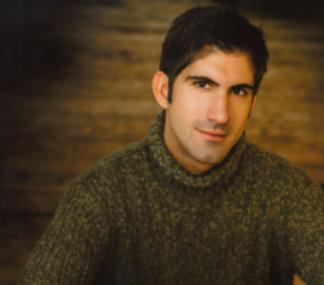It’s easy for those of us in the out-and-proud queer community to forget how many of our brothers and sisters live their lives in the closet. Connecting with this reality was the big challenge for Aidan deSalaiz in playing Ross, his character in Jeff Baron’s Visiting Mr Green.
A Harvard-educated New York City finance executive climbing the corporate ladder, Ross is torn between being true to his identity and the social realities of his field, something deSalaiz has, fortunately, never had to do.
“I had a vocation to go into the theatre, which meant I didn’t have to deal with the kind of homophobia someone in the world of business might,” he says. “In Ross’s case he had a messy coming out to his family, which left him very isolated and emotionally vulnerable. He works in the boys’ club of Wall Street, which means he can’t have both a career and a life as a gay man.”
Ross seems content to sacrifice romantic fulfillment for professional success. But things start to unravel when his luxury sedan nearly makes latke of Mr Green (Theodore Bikel), a recently widowed octogenarian Orthodox Jew. An activist judge (to borrow a favourite phrase of our southern neighbours) sentences him to weekly visits with his almost-casualty. Despite initially insisting he has no need of company, Mr Green eventually warms to Ross and they strike up an uncomfortable camaraderie that forces both of them to confront things about themselves they’d rather not.
Loosely based on Baron’s own life (he was also Harvard educated and worked in finance), the play has had more than 300 productions worldwide, including a yearlong stint off-Broadway, since it premiered in 1996. Despite some saccharinely heartwarming and occasionally implausible twists, the core argument about the effects of religious intolerance on sexual minorities rescues it from being a simple feel-good piece.
“Ross is a Reform Jew, but he still struggles with his sexuality,” deSalaiz says. “Mr Green is deeply religious and leaps to a defence of homophobia based on what the Torah says. The play illustrates the impacts these things can have within a family. Silence on an issue like sexuality or anything else considered unacceptable is a powerful and dangerous tool. The more we pretend we don’t need to talk about something, the more fear builds.”
DeSalaiz was fortunate to have a coming-out story nothing like his character’s. The youngest of four children, his family was readily accepting. Well aware that his experience is not necessarily the norm, he understands the need for families to consider the impact their religious beliefs may have on their children.
“It’s really important for young people to know they aren’t alone, even if they can’t find that support within their family structure. Being made to feel like you are worthless to your family and you have no one to talk to is the kind of thing that pushes some kids over the edge.”
Despite the relative ease his family and career path afforded him in his coming-out process, deSalaiz is by no means blind to the realities of others struggling with the same issues.
“We think of Toronto as this liberal gay Mecca, and it’s easy to forget we’re not quite there in terms of being the kind of society we should be,” he says. “The fact we have a mayor who refuses to have any part of Pride shows we aren’t as progressive as we’d like to think we are.”
The Deets:
Visiting Mr Green
Harold Green Jewish Theatre Company
Runs till Sun, Feb 18 at 8pm
Jane Mallett Theatre
St Lawrence Centre for the Arts
27 Front St E
stlc.com.


 Why you can trust Xtra
Why you can trust Xtra


